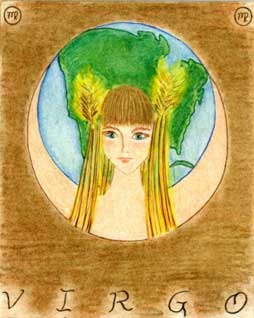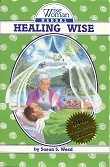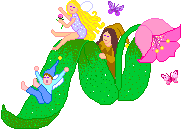Glorious Goldenrod
© 2006 Susun S Weed
As seen printed in Mystic Pop Magazine
I love autumn; don't you? The days shorten and fall colors thrill my senses. Perennial roots get busy storing nourishment that will last them through the winter. And the meadows bloom with purple asters and riotous goldenrod flowers.
Goldenrod (the Solidago genus, Asteracea family) is one of my favorite plants, and hopefully, soon it will be one of your favorites too.
 Before you complain that goldenrod is a pest and you're allergic to it, let me set the record straight: You aren't. No one is, no one can be, allergic to goldenrod pollen. Why? It has virtually none. What little pollen it makes is sticky, all the better to stick onto insects who pollinate the goldenrod. Only wind-pollinated plants -- like ragweed (Ambrosia artemisifolia), which blooms at the same time as goldenrod, and has an especially irritating pollen -- make enough pollen, and spread it widely enough, to cause allergic reactions.
Before you complain that goldenrod is a pest and you're allergic to it, let me set the record straight: You aren't. No one is, no one can be, allergic to goldenrod pollen. Why? It has virtually none. What little pollen it makes is sticky, all the better to stick onto insects who pollinate the goldenrod. Only wind-pollinated plants -- like ragweed (Ambrosia artemisifolia), which blooms at the same time as goldenrod, and has an especially irritating pollen -- make enough pollen, and spread it widely enough, to cause allergic reactions.
Set aside your mistaken bad thoughts about lovely goldenrod, and, if you can, visit a patch. Goldenrod is a wide-spread wild plant in North America (found from Florida to New Hampshire and west into Texas), Europe, and Asia. Goldenrod is also treasured as a garden plant from New Zealand to Germany, and has become a highly-successful weed in Japan. So, no matter where you live as you read this article, it is likely that you can find a patch of goldenrod.
It is rare to see one goldenrod plant growing alone; it multiplies by sending out root runners, so there are usually dozens of plants growing densely together. Notice all the bees and insects happily crawling about on goldenrod's numerous small yellow flowers.
There are many types of goldenrod, and you are likely to find several kinds if you look around. The species Solidago canadensis and S. odora are considered the most medicinal (and the tastiest), but all species of goldenrod are safe and beneficial and can be used to help the immune system get ready for winter.
Goldenrod tonics are easy to make. Harvest any goldenrod by cutting the top third of the plant in full flower on a sunny fall day. Or, respectfully pull the entire plant, roots and all, in the late autumn or early winter. Then follow the simple directions below. Note: You can use any size jar when making a vinegar or a tincture, so long as you fill it full.
To dry flowering goldenrod:
Bundle 2-3 stalks together and hang upside down in a cool, shady room until thoroughly dry. When the stalks snap crisply, store the dried herb in brown paper bags. One or two large handfuls of crushed leaves and flowers, steeped in a quart of boiling water for thirty minutes makes a tea that can be used hot, with honey, to counter allergies (especially pollen allergies), fevers, sore throats, coughs, colds and the flu; or taken cold to relieve colic in babies, and gas in adults. Dried mint and/or yarrow are tasty, and useful, additions when making goldenrod flower tea.
To dry goldenrod roots:
Rinse dirt off the roots, then cut away all th estalks, leaves and dead flowers. If possible, hang your roots over a woodstove to dry; if not, place them on racks and put them in a warm place to dry until brittle. Store in glass jars. Depending on the difficulty you are addressing, goldenrod root tea may be made with large or small amounts of the roots brewed or decocted in boiling water. Or the roots may be powdered, alone or mixed with flowers, and applied to hard-to-heal wounds and sore joints.
 To make a goldenrod vinegar:
To make a goldenrod vinegar:
Chop the goldenrod coarsely, filling a jar with chopped flowers, leaves, stalks (and roots if you have them); then fill the jar to the top with room-temperature, pasteurized, apple cider vinegar. Cap it tightly with a plastic lid. (Metal lids will be eroded by the action of the vinegar. If you must use one, protect it with several layers of plastic between it and the vinegar.) Be sure to label your vinegar with the date and contents. Your goldenrod vinegar will be ready to use in six weeks to improve mineral balance, help prevent kidney stones, eliminate flatulance, and improve immune functioning.
To make a goldenrod tincture:
Chop the goldenrod coarsely, filling a jar with chopped flowers, leaves, stalks (and roots if you have them); then add 100 proof vodka, filling the jar to the very top. Cap tightly and label. Your goldenrod tincture will be ready to use in six weeks, by the dropperful, as an anti-inflammatory, a sweat-inducing cold cure, and an astringent digestive aid. Medical herbalists use large doses (up to 4 dropperfuls at a time) of goldenrod tincture several times daily to treat kidney problems -- including nephritis, hemorrhage, kidney stones, and inability to void -- and prostate problems, including frequent urination.
The colonists called goldenrod tea "Liberty Tea," for they drank it instead of black tea after the Boston Tea Party. In fact, Liberty Tea proved so popular, it was exported to China! Let goldenrod liberate you, too. Herbal medicine is people's medicine, a gift from Mama Earth to us.
Green Blessings.
Susun S Weed

Healing
Magic:
A Green Witch Guidebook to Conscious Living
 by Robin
Rose Bennett
by Robin
Rose Bennett
Follow the path to physical and spiritual health with this how-to
manual filled with ancient lore and wisdom. Using stories, songs,
rituals, recipes, meditations, and trance journeys, it suggests
more than 100 ways to practice the art of magical healing. Find
out how to reconnect with the earth and draw on its energy, interact
with the power of the seven chakras, make use of moon magic and
women's wisdom, prepare herbal infusions and baths, work with the
medicine wheel, and cast spells for love and wealth. No matter what
your beliefs, this guidebook will open your heart and mind to the
joys of everyday life.
Price:
$14.95 plus shipping
Other articles by Robin Rose Bennett
An Herbalists Notebook part 1
An Herbalists Notebook part 2
Order HEALING MAGIC in our Bookshop
"Robin has been practicing Earth Spirit healing, herbalism and Wise Woman ways for twenty years and is an incredibly gifted spiritual teacher, healer and ceremonialist. Robin's powerful teachings come to the reader through a personal writing style that is immediately engaging, sharing practical wisdom through anecdote and example."
Jen Prosser, Sunstone Herbs
Healing
Wise
 by Susun
S. Weed
by Susun
S. Weed
Introduction by Jean Houston.
Superb herbal in the feminine-intuitive mode. Complete instructions for using common plants for food, beauty, medicine, and longevity. Seven herbs -- burdock, chickweed, dandelion, nettle,
oatstraw, seaweed, and violet -- are explored in depth.
A Special Tenth Anniversary edition of this
classic herbal, profusely illustrated. 312 pages.
Retails for $21.95
Read a Review
Order HEALING WISE in our Bookshop
I just started reading your book, Healing Wise. Your
humor and approach to life seem so "down-to-earth",
just like your favorite powerful weeds. Thank you for sharing
and nourishing! ~ Diane







